Individual Report: Debenhams' Organisational Culture and Effectiveness
VerifiedAdded on 2023/01/06
|13
|3497
|77
Report
AI Summary
This report provides a comprehensive analysis of Debenhams' organizational culture, focusing on its application of Handy's role culture model. It examines how the company's culture influences organizational effectiveness, with a specific emphasis on the role of communication in building positive relationships, fostering two-way information flow, and engaging consistent performers in strategic planning. The report evaluates the impact of Debenhams' culture on employee motivation, highlighting how defined roles and responsibilities contribute to increased efficiency and a sense of ownership among employees. Additionally, it discusses how Debenhams can leverage its existing culture to further enhance its success by communicating values, beliefs, and objectives effectively to the workforce. The report also acknowledges the limitations of role culture, such as potential gaps between superiors and subordinates, and its bureaucratic nature, which are crucial for a balanced understanding of its application within the organization.
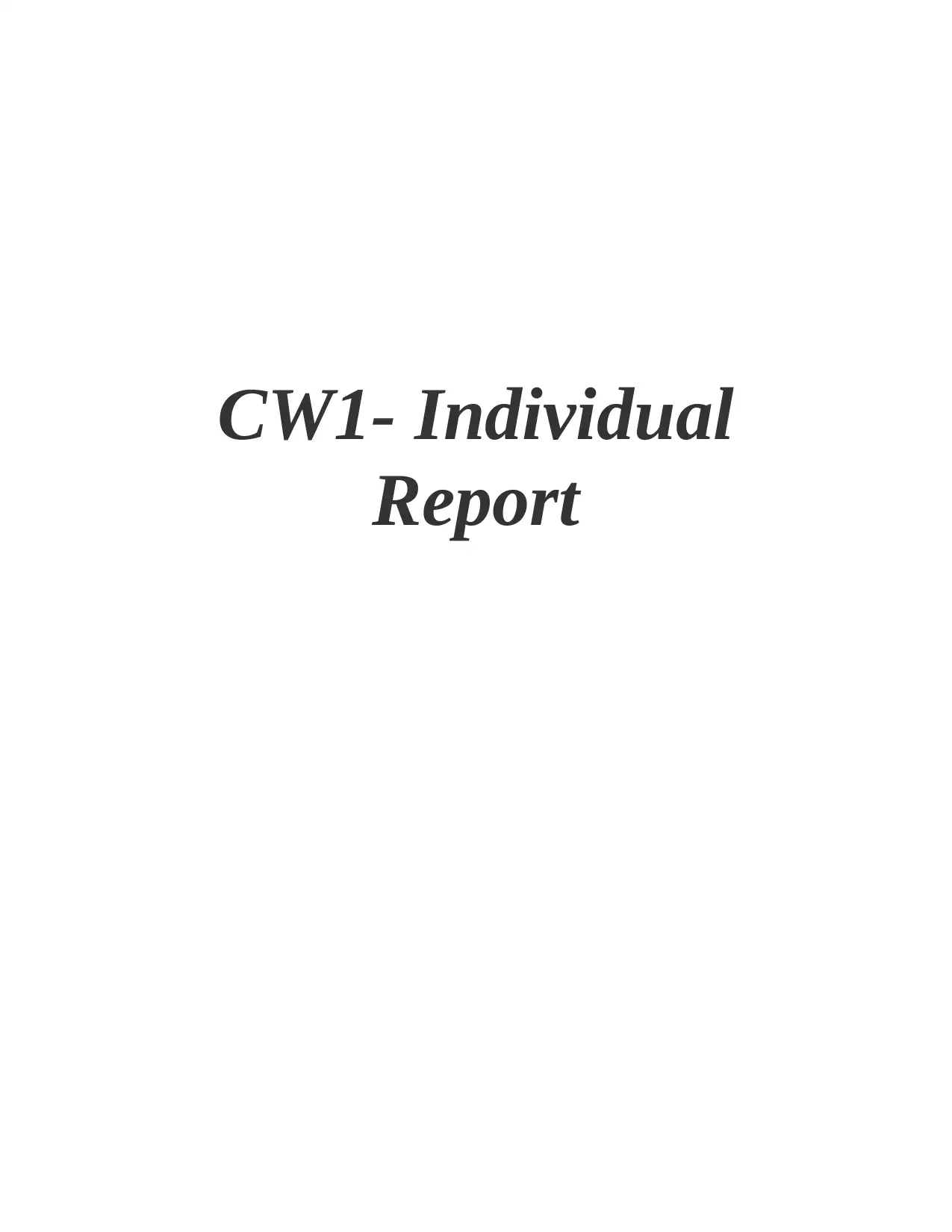
CW1- Individual
Report
Report
Paraphrase This Document
Need a fresh take? Get an instant paraphrase of this document with our AI Paraphraser
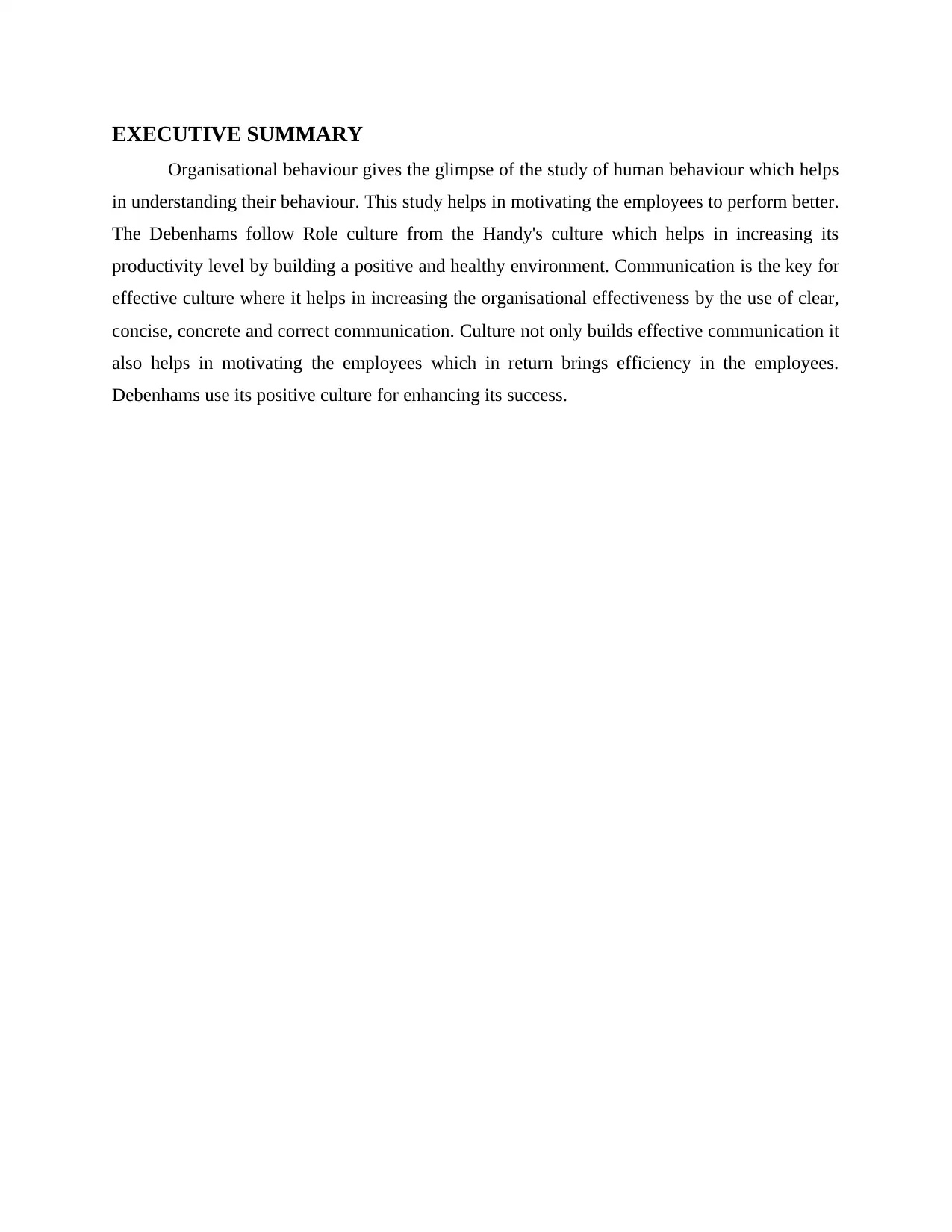
EXECUTIVE SUMMARY
Organisational behaviour gives the glimpse of the study of human behaviour which helps
in understanding their behaviour. This study helps in motivating the employees to perform better.
The Debenhams follow Role culture from the Handy's culture which helps in increasing its
productivity level by building a positive and healthy environment. Communication is the key for
effective culture where it helps in increasing the organisational effectiveness by the use of clear,
concise, concrete and correct communication. Culture not only builds effective communication it
also helps in motivating the employees which in return brings efficiency in the employees.
Debenhams use its positive culture for enhancing its success.
Organisational behaviour gives the glimpse of the study of human behaviour which helps
in understanding their behaviour. This study helps in motivating the employees to perform better.
The Debenhams follow Role culture from the Handy's culture which helps in increasing its
productivity level by building a positive and healthy environment. Communication is the key for
effective culture where it helps in increasing the organisational effectiveness by the use of clear,
concise, concrete and correct communication. Culture not only builds effective communication it
also helps in motivating the employees which in return brings efficiency in the employees.
Debenhams use its positive culture for enhancing its success.
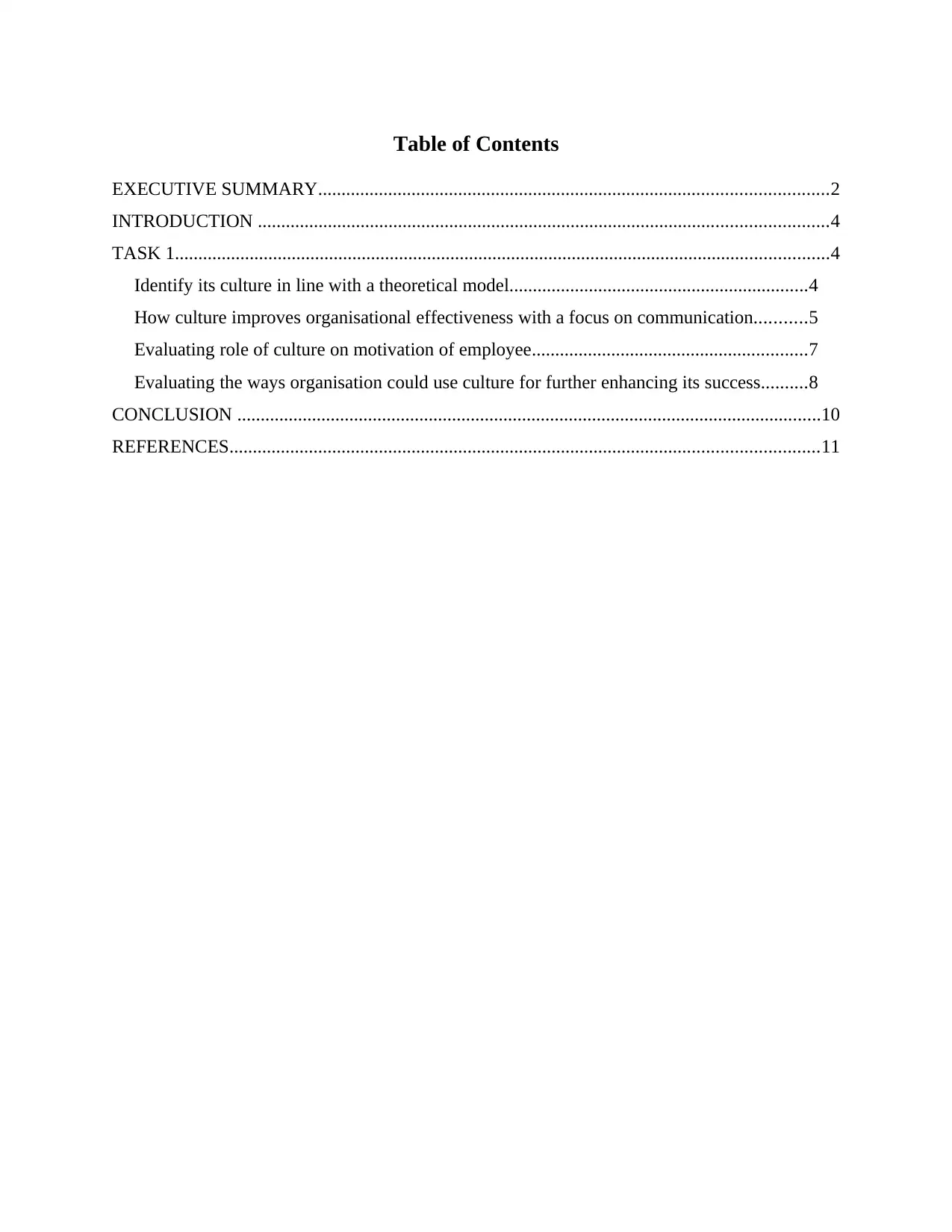
Table of Contents
EXECUTIVE SUMMARY.............................................................................................................2
INTRODUCTION ..........................................................................................................................4
TASK 1............................................................................................................................................4
Identify its culture in line with a theoretical model................................................................4
How culture improves organisational effectiveness with a focus on communication...........5
Evaluating role of culture on motivation of employee...........................................................7
Evaluating the ways organisation could use culture for further enhancing its success..........8
CONCLUSION .............................................................................................................................10
REFERENCES..............................................................................................................................11
EXECUTIVE SUMMARY.............................................................................................................2
INTRODUCTION ..........................................................................................................................4
TASK 1............................................................................................................................................4
Identify its culture in line with a theoretical model................................................................4
How culture improves organisational effectiveness with a focus on communication...........5
Evaluating role of culture on motivation of employee...........................................................7
Evaluating the ways organisation could use culture for further enhancing its success..........8
CONCLUSION .............................................................................................................................10
REFERENCES..............................................................................................................................11
⊘ This is a preview!⊘
Do you want full access?
Subscribe today to unlock all pages.

Trusted by 1+ million students worldwide
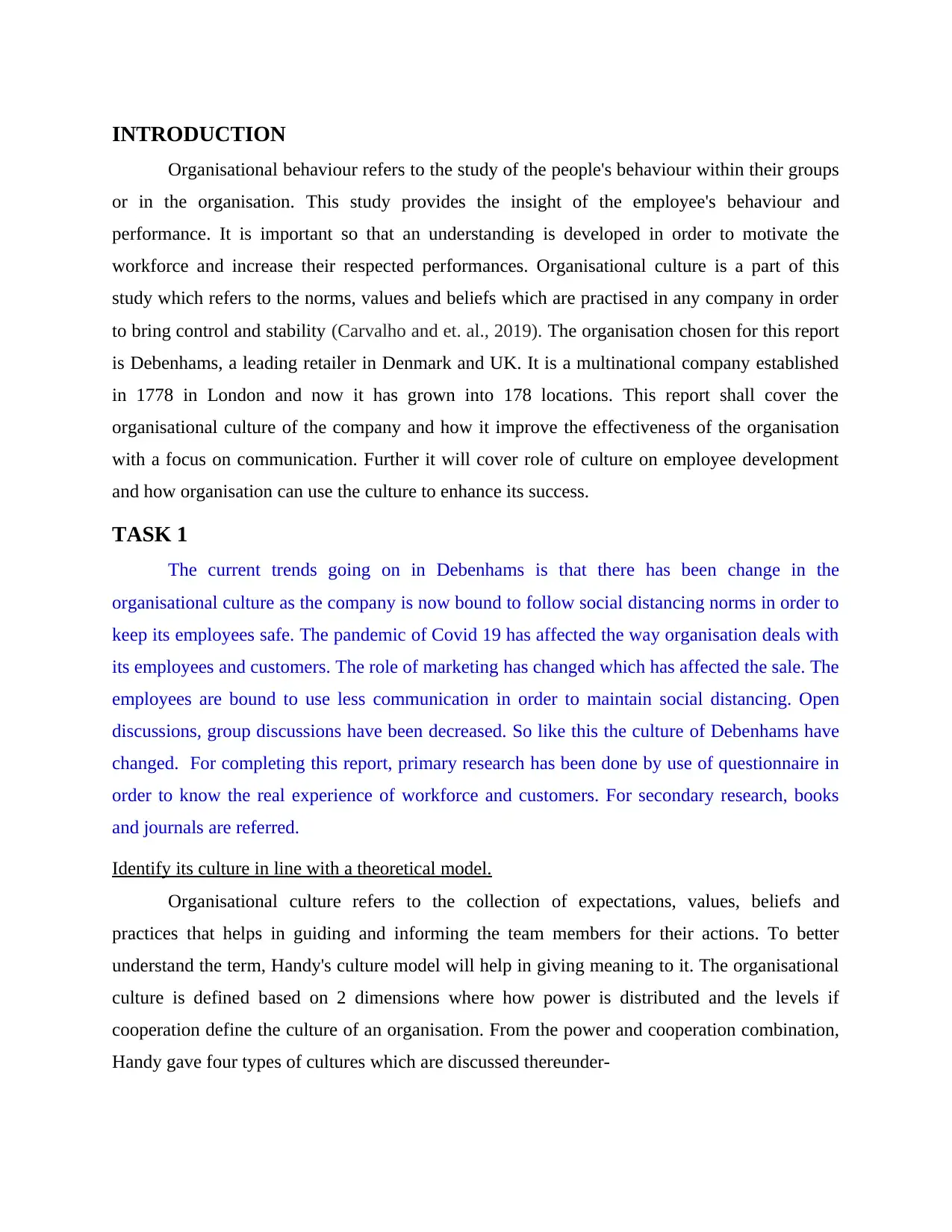
INTRODUCTION
Organisational behaviour refers to the study of the people's behaviour within their groups
or in the organisation. This study provides the insight of the employee's behaviour and
performance. It is important so that an understanding is developed in order to motivate the
workforce and increase their respected performances. Organisational culture is a part of this
study which refers to the norms, values and beliefs which are practised in any company in order
to bring control and stability (Carvalho and et. al., 2019). The organisation chosen for this report
is Debenhams, a leading retailer in Denmark and UK. It is a multinational company established
in 1778 in London and now it has grown into 178 locations. This report shall cover the
organisational culture of the company and how it improve the effectiveness of the organisation
with a focus on communication. Further it will cover role of culture on employee development
and how organisation can use the culture to enhance its success.
TASK 1
The current trends going on in Debenhams is that there has been change in the
organisational culture as the company is now bound to follow social distancing norms in order to
keep its employees safe. The pandemic of Covid 19 has affected the way organisation deals with
its employees and customers. The role of marketing has changed which has affected the sale. The
employees are bound to use less communication in order to maintain social distancing. Open
discussions, group discussions have been decreased. So like this the culture of Debenhams have
changed. For completing this report, primary research has been done by use of questionnaire in
order to know the real experience of workforce and customers. For secondary research, books
and journals are referred.
Identify its culture in line with a theoretical model.
Organisational culture refers to the collection of expectations, values, beliefs and
practices that helps in guiding and informing the team members for their actions. To better
understand the term, Handy's culture model will help in giving meaning to it. The organisational
culture is defined based on 2 dimensions where how power is distributed and the levels if
cooperation define the culture of an organisation. From the power and cooperation combination,
Handy gave four types of cultures which are discussed thereunder-
Organisational behaviour refers to the study of the people's behaviour within their groups
or in the organisation. This study provides the insight of the employee's behaviour and
performance. It is important so that an understanding is developed in order to motivate the
workforce and increase their respected performances. Organisational culture is a part of this
study which refers to the norms, values and beliefs which are practised in any company in order
to bring control and stability (Carvalho and et. al., 2019). The organisation chosen for this report
is Debenhams, a leading retailer in Denmark and UK. It is a multinational company established
in 1778 in London and now it has grown into 178 locations. This report shall cover the
organisational culture of the company and how it improve the effectiveness of the organisation
with a focus on communication. Further it will cover role of culture on employee development
and how organisation can use the culture to enhance its success.
TASK 1
The current trends going on in Debenhams is that there has been change in the
organisational culture as the company is now bound to follow social distancing norms in order to
keep its employees safe. The pandemic of Covid 19 has affected the way organisation deals with
its employees and customers. The role of marketing has changed which has affected the sale. The
employees are bound to use less communication in order to maintain social distancing. Open
discussions, group discussions have been decreased. So like this the culture of Debenhams have
changed. For completing this report, primary research has been done by use of questionnaire in
order to know the real experience of workforce and customers. For secondary research, books
and journals are referred.
Identify its culture in line with a theoretical model.
Organisational culture refers to the collection of expectations, values, beliefs and
practices that helps in guiding and informing the team members for their actions. To better
understand the term, Handy's culture model will help in giving meaning to it. The organisational
culture is defined based on 2 dimensions where how power is distributed and the levels if
cooperation define the culture of an organisation. From the power and cooperation combination,
Handy gave four types of cultures which are discussed thereunder-
Paraphrase This Document
Need a fresh take? Get an instant paraphrase of this document with our AI Paraphraser
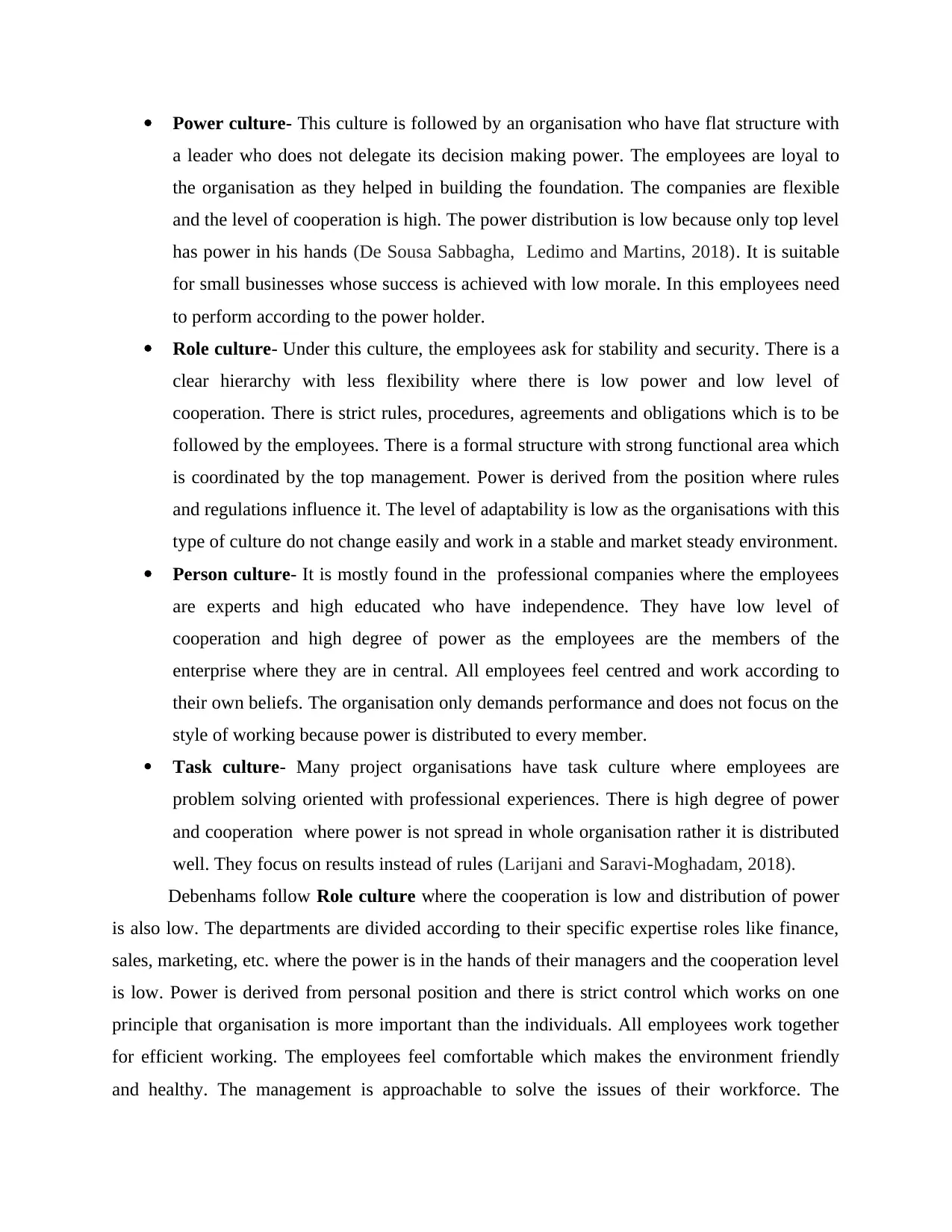
Power culture- This culture is followed by an organisation who have flat structure with
a leader who does not delegate its decision making power. The employees are loyal to
the organisation as they helped in building the foundation. The companies are flexible
and the level of cooperation is high. The power distribution is low because only top level
has power in his hands (De Sousa Sabbagha, Ledimo and Martins, 2018). It is suitable
for small businesses whose success is achieved with low morale. In this employees need
to perform according to the power holder.
Role culture- Under this culture, the employees ask for stability and security. There is a
clear hierarchy with less flexibility where there is low power and low level of
cooperation. There is strict rules, procedures, agreements and obligations which is to be
followed by the employees. There is a formal structure with strong functional area which
is coordinated by the top management. Power is derived from the position where rules
and regulations influence it. The level of adaptability is low as the organisations with this
type of culture do not change easily and work in a stable and market steady environment.
Person culture- It is mostly found in the professional companies where the employees
are experts and high educated who have independence. They have low level of
cooperation and high degree of power as the employees are the members of the
enterprise where they are in central. All employees feel centred and work according to
their own beliefs. The organisation only demands performance and does not focus on the
style of working because power is distributed to every member.
Task culture- Many project organisations have task culture where employees are
problem solving oriented with professional experiences. There is high degree of power
and cooperation where power is not spread in whole organisation rather it is distributed
well. They focus on results instead of rules (Larijani and Saravi-Moghadam, 2018).
Debenhams follow Role culture where the cooperation is low and distribution of power
is also low. The departments are divided according to their specific expertise roles like finance,
sales, marketing, etc. where the power is in the hands of their managers and the cooperation level
is low. Power is derived from personal position and there is strict control which works on one
principle that organisation is more important than the individuals. All employees work together
for efficient working. The employees feel comfortable which makes the environment friendly
and healthy. The management is approachable to solve the issues of their workforce. The
a leader who does not delegate its decision making power. The employees are loyal to
the organisation as they helped in building the foundation. The companies are flexible
and the level of cooperation is high. The power distribution is low because only top level
has power in his hands (De Sousa Sabbagha, Ledimo and Martins, 2018). It is suitable
for small businesses whose success is achieved with low morale. In this employees need
to perform according to the power holder.
Role culture- Under this culture, the employees ask for stability and security. There is a
clear hierarchy with less flexibility where there is low power and low level of
cooperation. There is strict rules, procedures, agreements and obligations which is to be
followed by the employees. There is a formal structure with strong functional area which
is coordinated by the top management. Power is derived from the position where rules
and regulations influence it. The level of adaptability is low as the organisations with this
type of culture do not change easily and work in a stable and market steady environment.
Person culture- It is mostly found in the professional companies where the employees
are experts and high educated who have independence. They have low level of
cooperation and high degree of power as the employees are the members of the
enterprise where they are in central. All employees feel centred and work according to
their own beliefs. The organisation only demands performance and does not focus on the
style of working because power is distributed to every member.
Task culture- Many project organisations have task culture where employees are
problem solving oriented with professional experiences. There is high degree of power
and cooperation where power is not spread in whole organisation rather it is distributed
well. They focus on results instead of rules (Larijani and Saravi-Moghadam, 2018).
Debenhams follow Role culture where the cooperation is low and distribution of power
is also low. The departments are divided according to their specific expertise roles like finance,
sales, marketing, etc. where the power is in the hands of their managers and the cooperation level
is low. Power is derived from personal position and there is strict control which works on one
principle that organisation is more important than the individuals. All employees work together
for efficient working. The employees feel comfortable which makes the environment friendly
and healthy. The management is approachable to solve the issues of their workforce. The
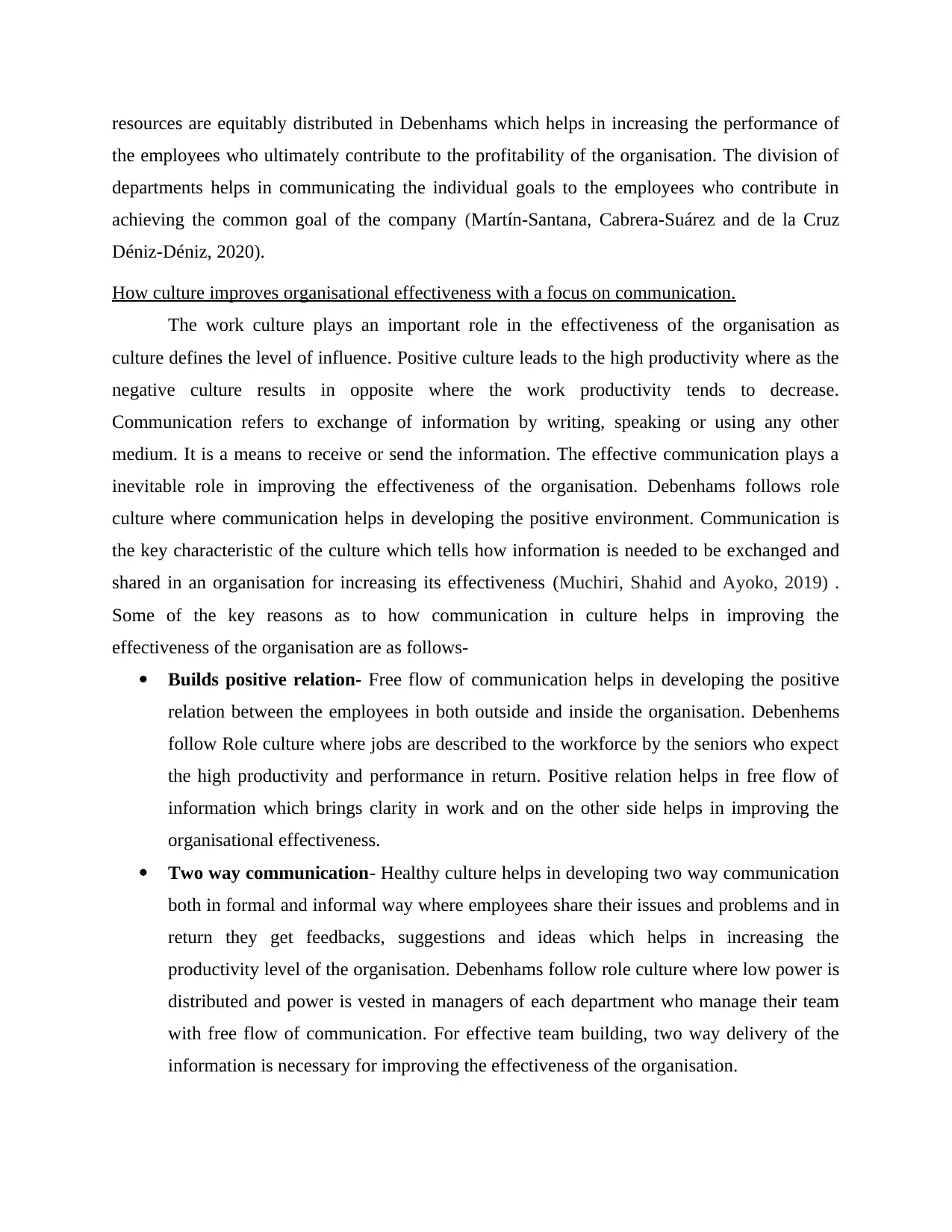
resources are equitably distributed in Debenhams which helps in increasing the performance of
the employees who ultimately contribute to the profitability of the organisation. The division of
departments helps in communicating the individual goals to the employees who contribute in
achieving the common goal of the company (Martín-Santana, Cabrera-Suárez and de la Cruz
Déniz-Déniz, 2020).
How culture improves organisational effectiveness with a focus on communication.
The work culture plays an important role in the effectiveness of the organisation as
culture defines the level of influence. Positive culture leads to the high productivity where as the
negative culture results in opposite where the work productivity tends to decrease.
Communication refers to exchange of information by writing, speaking or using any other
medium. It is a means to receive or send the information. The effective communication plays a
inevitable role in improving the effectiveness of the organisation. Debenhams follows role
culture where communication helps in developing the positive environment. Communication is
the key characteristic of the culture which tells how information is needed to be exchanged and
shared in an organisation for increasing its effectiveness (Muchiri, Shahid and Ayoko, 2019) .
Some of the key reasons as to how communication in culture helps in improving the
effectiveness of the organisation are as follows-
Builds positive relation- Free flow of communication helps in developing the positive
relation between the employees in both outside and inside the organisation. Debenhems
follow Role culture where jobs are described to the workforce by the seniors who expect
the high productivity and performance in return. Positive relation helps in free flow of
information which brings clarity in work and on the other side helps in improving the
organisational effectiveness.
Two way communication- Healthy culture helps in developing two way communication
both in formal and informal way where employees share their issues and problems and in
return they get feedbacks, suggestions and ideas which helps in increasing the
productivity level of the organisation. Debenhams follow role culture where low power is
distributed and power is vested in managers of each department who manage their team
with free flow of communication. For effective team building, two way delivery of the
information is necessary for improving the effectiveness of the organisation.
the employees who ultimately contribute to the profitability of the organisation. The division of
departments helps in communicating the individual goals to the employees who contribute in
achieving the common goal of the company (Martín-Santana, Cabrera-Suárez and de la Cruz
Déniz-Déniz, 2020).
How culture improves organisational effectiveness with a focus on communication.
The work culture plays an important role in the effectiveness of the organisation as
culture defines the level of influence. Positive culture leads to the high productivity where as the
negative culture results in opposite where the work productivity tends to decrease.
Communication refers to exchange of information by writing, speaking or using any other
medium. It is a means to receive or send the information. The effective communication plays a
inevitable role in improving the effectiveness of the organisation. Debenhams follows role
culture where communication helps in developing the positive environment. Communication is
the key characteristic of the culture which tells how information is needed to be exchanged and
shared in an organisation for increasing its effectiveness (Muchiri, Shahid and Ayoko, 2019) .
Some of the key reasons as to how communication in culture helps in improving the
effectiveness of the organisation are as follows-
Builds positive relation- Free flow of communication helps in developing the positive
relation between the employees in both outside and inside the organisation. Debenhems
follow Role culture where jobs are described to the workforce by the seniors who expect
the high productivity and performance in return. Positive relation helps in free flow of
information which brings clarity in work and on the other side helps in improving the
organisational effectiveness.
Two way communication- Healthy culture helps in developing two way communication
both in formal and informal way where employees share their issues and problems and in
return they get feedbacks, suggestions and ideas which helps in increasing the
productivity level of the organisation. Debenhams follow role culture where low power is
distributed and power is vested in managers of each department who manage their team
with free flow of communication. For effective team building, two way delivery of the
information is necessary for improving the effectiveness of the organisation.
⊘ This is a preview!⊘
Do you want full access?
Subscribe today to unlock all pages.

Trusted by 1+ million students worldwide
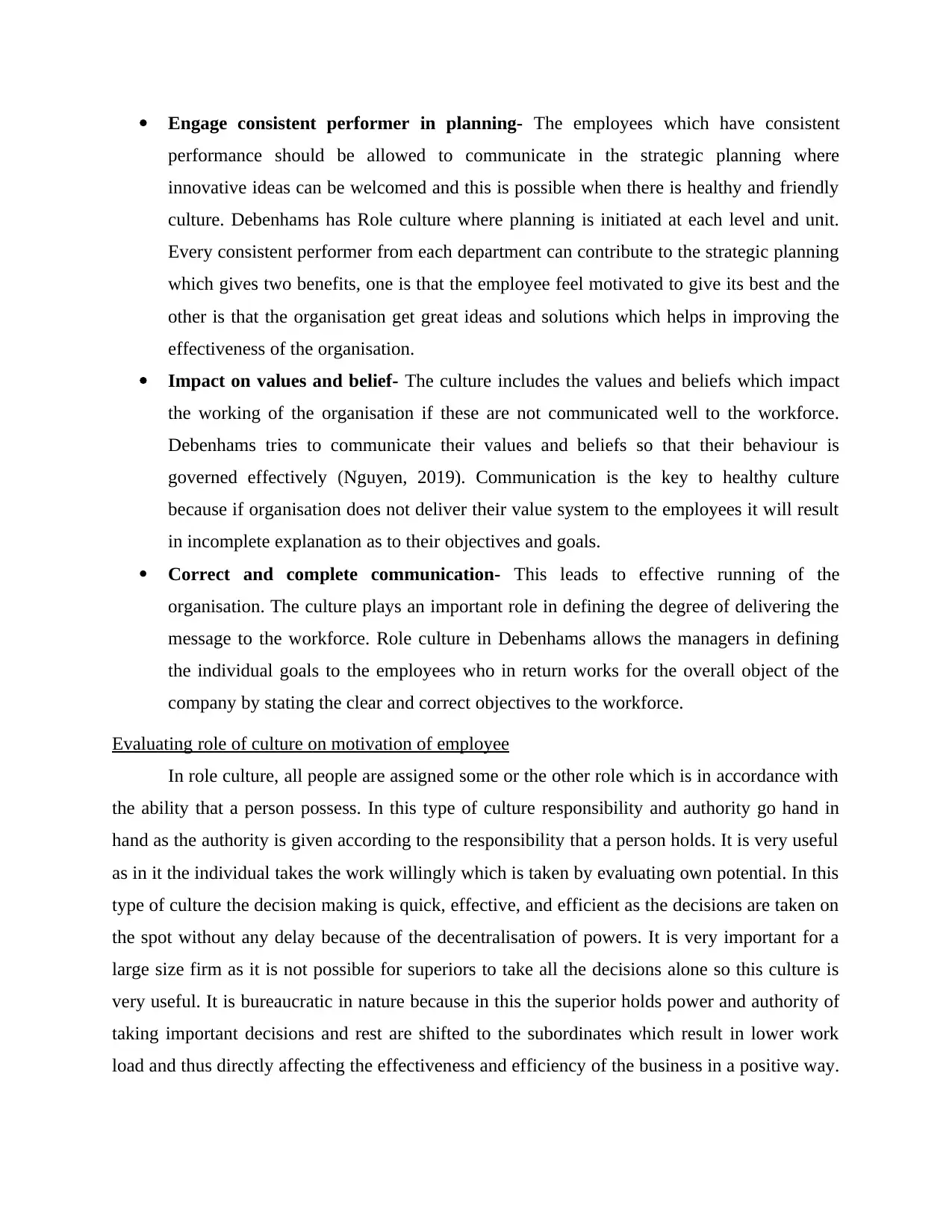
Engage consistent performer in planning- The employees which have consistent
performance should be allowed to communicate in the strategic planning where
innovative ideas can be welcomed and this is possible when there is healthy and friendly
culture. Debenhams has Role culture where planning is initiated at each level and unit.
Every consistent performer from each department can contribute to the strategic planning
which gives two benefits, one is that the employee feel motivated to give its best and the
other is that the organisation get great ideas and solutions which helps in improving the
effectiveness of the organisation.
Impact on values and belief- The culture includes the values and beliefs which impact
the working of the organisation if these are not communicated well to the workforce.
Debenhams tries to communicate their values and beliefs so that their behaviour is
governed effectively (Nguyen, 2019). Communication is the key to healthy culture
because if organisation does not deliver their value system to the employees it will result
in incomplete explanation as to their objectives and goals.
Correct and complete communication- This leads to effective running of the
organisation. The culture plays an important role in defining the degree of delivering the
message to the workforce. Role culture in Debenhams allows the managers in defining
the individual goals to the employees who in return works for the overall object of the
company by stating the clear and correct objectives to the workforce.
Evaluating role of culture on motivation of employee
In role culture, all people are assigned some or the other role which is in accordance with
the ability that a person possess. In this type of culture responsibility and authority go hand in
hand as the authority is given according to the responsibility that a person holds. It is very useful
as in it the individual takes the work willingly which is taken by evaluating own potential. In this
type of culture the decision making is quick, effective, and efficient as the decisions are taken on
the spot without any delay because of the decentralisation of powers. It is very important for a
large size firm as it is not possible for superiors to take all the decisions alone so this culture is
very useful. It is bureaucratic in nature because in this the superior holds power and authority of
taking important decisions and rest are shifted to the subordinates which result in lower work
load and thus directly affecting the effectiveness and efficiency of the business in a positive way.
performance should be allowed to communicate in the strategic planning where
innovative ideas can be welcomed and this is possible when there is healthy and friendly
culture. Debenhams has Role culture where planning is initiated at each level and unit.
Every consistent performer from each department can contribute to the strategic planning
which gives two benefits, one is that the employee feel motivated to give its best and the
other is that the organisation get great ideas and solutions which helps in improving the
effectiveness of the organisation.
Impact on values and belief- The culture includes the values and beliefs which impact
the working of the organisation if these are not communicated well to the workforce.
Debenhams tries to communicate their values and beliefs so that their behaviour is
governed effectively (Nguyen, 2019). Communication is the key to healthy culture
because if organisation does not deliver their value system to the employees it will result
in incomplete explanation as to their objectives and goals.
Correct and complete communication- This leads to effective running of the
organisation. The culture plays an important role in defining the degree of delivering the
message to the workforce. Role culture in Debenhams allows the managers in defining
the individual goals to the employees who in return works for the overall object of the
company by stating the clear and correct objectives to the workforce.
Evaluating role of culture on motivation of employee
In role culture, all people are assigned some or the other role which is in accordance with
the ability that a person possess. In this type of culture responsibility and authority go hand in
hand as the authority is given according to the responsibility that a person holds. It is very useful
as in it the individual takes the work willingly which is taken by evaluating own potential. In this
type of culture the decision making is quick, effective, and efficient as the decisions are taken on
the spot without any delay because of the decentralisation of powers. It is very important for a
large size firm as it is not possible for superiors to take all the decisions alone so this culture is
very useful. It is bureaucratic in nature because in this the superior holds power and authority of
taking important decisions and rest are shifted to the subordinates which result in lower work
load and thus directly affecting the effectiveness and efficiency of the business in a positive way.
Paraphrase This Document
Need a fresh take? Get an instant paraphrase of this document with our AI Paraphraser
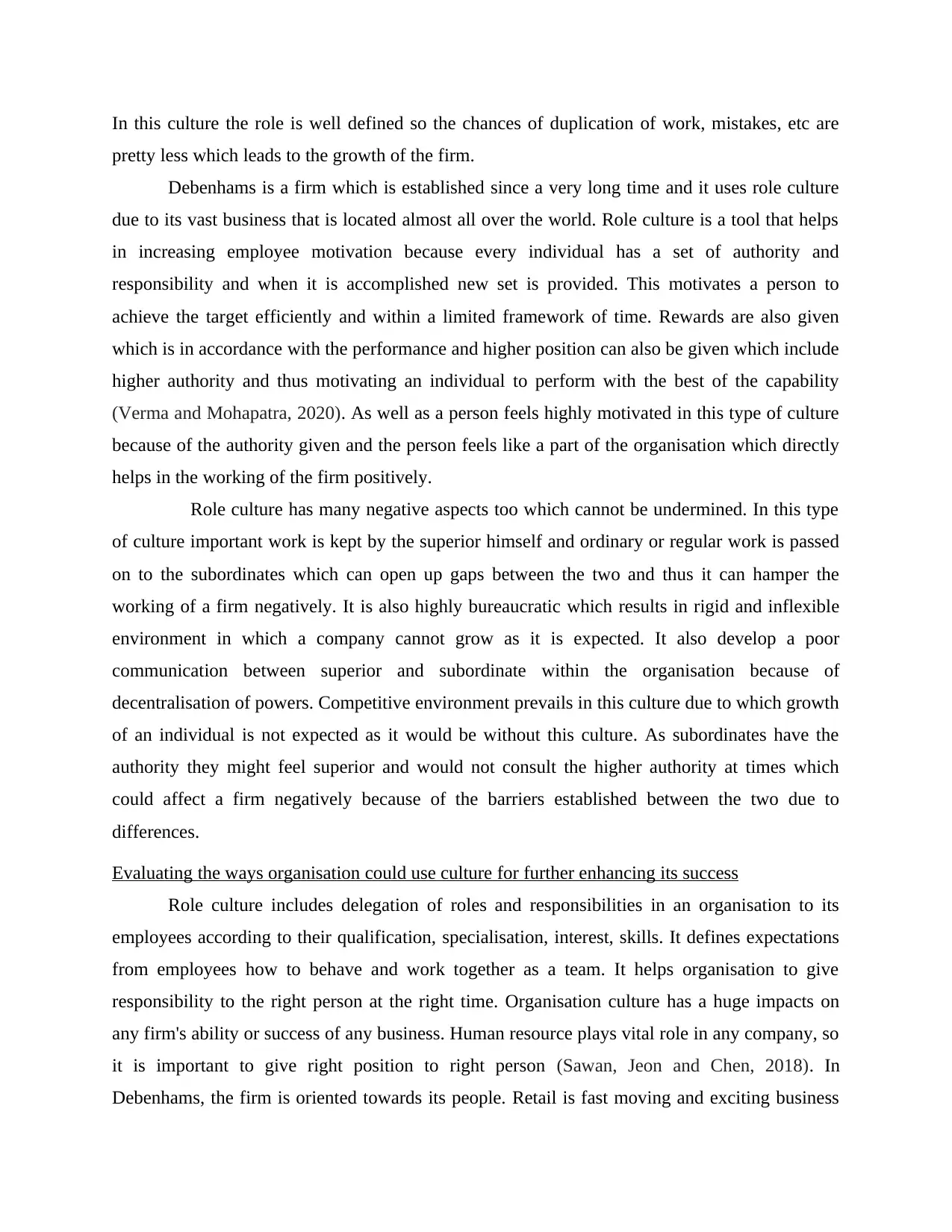
In this culture the role is well defined so the chances of duplication of work, mistakes, etc are
pretty less which leads to the growth of the firm.
Debenhams is a firm which is established since a very long time and it uses role culture
due to its vast business that is located almost all over the world. Role culture is a tool that helps
in increasing employee motivation because every individual has a set of authority and
responsibility and when it is accomplished new set is provided. This motivates a person to
achieve the target efficiently and within a limited framework of time. Rewards are also given
which is in accordance with the performance and higher position can also be given which include
higher authority and thus motivating an individual to perform with the best of the capability
(Verma and Mohapatra, 2020). As well as a person feels highly motivated in this type of culture
because of the authority given and the person feels like a part of the organisation which directly
helps in the working of the firm positively.
Role culture has many negative aspects too which cannot be undermined. In this type
of culture important work is kept by the superior himself and ordinary or regular work is passed
on to the subordinates which can open up gaps between the two and thus it can hamper the
working of a firm negatively. It is also highly bureaucratic which results in rigid and inflexible
environment in which a company cannot grow as it is expected. It also develop a poor
communication between superior and subordinate within the organisation because of
decentralisation of powers. Competitive environment prevails in this culture due to which growth
of an individual is not expected as it would be without this culture. As subordinates have the
authority they might feel superior and would not consult the higher authority at times which
could affect a firm negatively because of the barriers established between the two due to
differences.
Evaluating the ways organisation could use culture for further enhancing its success
Role culture includes delegation of roles and responsibilities in an organisation to its
employees according to their qualification, specialisation, interest, skills. It defines expectations
from employees how to behave and work together as a team. It helps organisation to give
responsibility to the right person at the right time. Organisation culture has a huge impacts on
any firm's ability or success of any business. Human resource plays vital role in any company, so
it is important to give right position to right person (Sawan, Jeon and Chen, 2018). In
Debenhams, the firm is oriented towards its people. Retail is fast moving and exciting business
pretty less which leads to the growth of the firm.
Debenhams is a firm which is established since a very long time and it uses role culture
due to its vast business that is located almost all over the world. Role culture is a tool that helps
in increasing employee motivation because every individual has a set of authority and
responsibility and when it is accomplished new set is provided. This motivates a person to
achieve the target efficiently and within a limited framework of time. Rewards are also given
which is in accordance with the performance and higher position can also be given which include
higher authority and thus motivating an individual to perform with the best of the capability
(Verma and Mohapatra, 2020). As well as a person feels highly motivated in this type of culture
because of the authority given and the person feels like a part of the organisation which directly
helps in the working of the firm positively.
Role culture has many negative aspects too which cannot be undermined. In this type
of culture important work is kept by the superior himself and ordinary or regular work is passed
on to the subordinates which can open up gaps between the two and thus it can hamper the
working of a firm negatively. It is also highly bureaucratic which results in rigid and inflexible
environment in which a company cannot grow as it is expected. It also develop a poor
communication between superior and subordinate within the organisation because of
decentralisation of powers. Competitive environment prevails in this culture due to which growth
of an individual is not expected as it would be without this culture. As subordinates have the
authority they might feel superior and would not consult the higher authority at times which
could affect a firm negatively because of the barriers established between the two due to
differences.
Evaluating the ways organisation could use culture for further enhancing its success
Role culture includes delegation of roles and responsibilities in an organisation to its
employees according to their qualification, specialisation, interest, skills. It defines expectations
from employees how to behave and work together as a team. It helps organisation to give
responsibility to the right person at the right time. Organisation culture has a huge impacts on
any firm's ability or success of any business. Human resource plays vital role in any company, so
it is important to give right position to right person (Sawan, Jeon and Chen, 2018). In
Debenhams, the firm is oriented towards its people. Retail is fast moving and exciting business
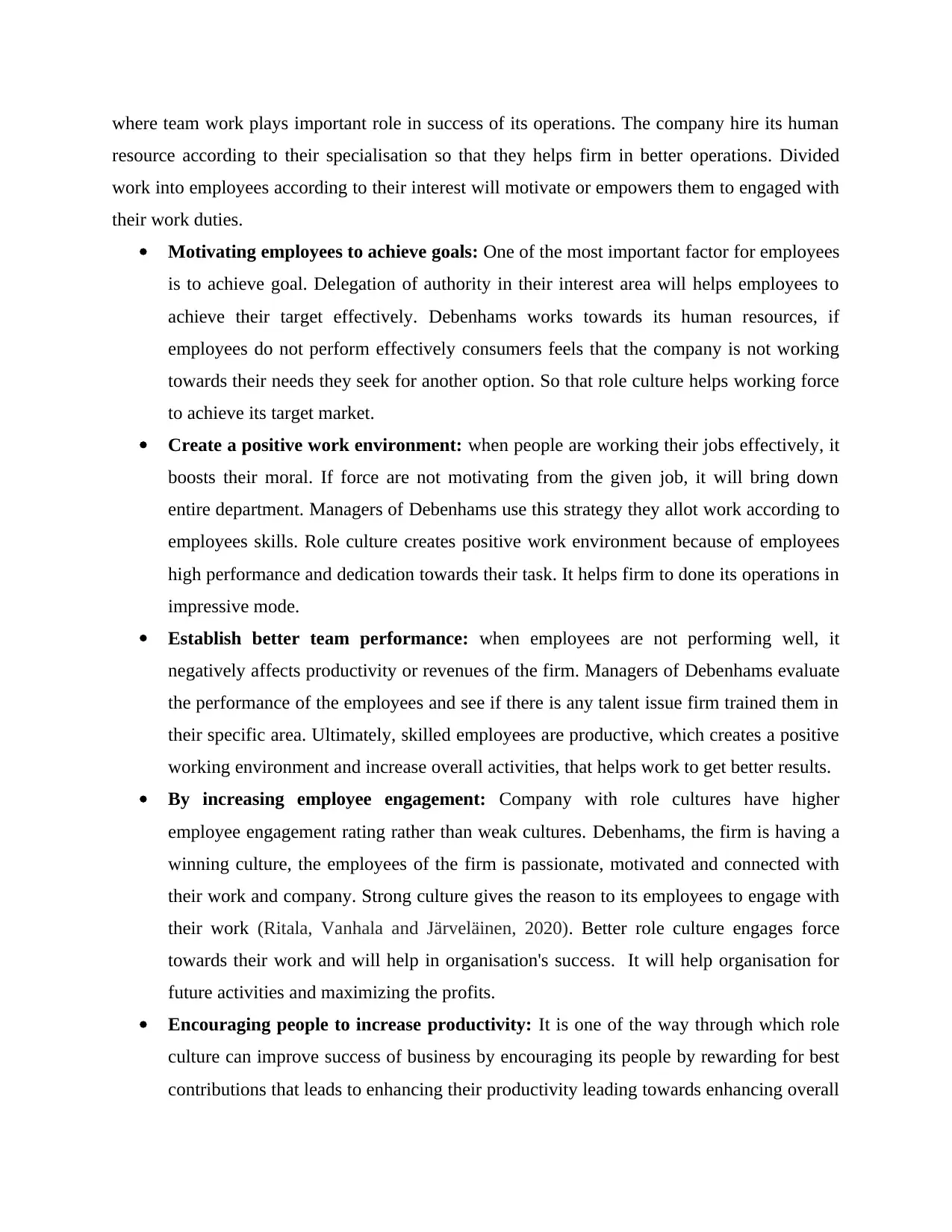
where team work plays important role in success of its operations. The company hire its human
resource according to their specialisation so that they helps firm in better operations. Divided
work into employees according to their interest will motivate or empowers them to engaged with
their work duties.
Motivating employees to achieve goals: One of the most important factor for employees
is to achieve goal. Delegation of authority in their interest area will helps employees to
achieve their target effectively. Debenhams works towards its human resources, if
employees do not perform effectively consumers feels that the company is not working
towards their needs they seek for another option. So that role culture helps working force
to achieve its target market.
Create a positive work environment: when people are working their jobs effectively, it
boosts their moral. If force are not motivating from the given job, it will bring down
entire department. Managers of Debenhams use this strategy they allot work according to
employees skills. Role culture creates positive work environment because of employees
high performance and dedication towards their task. It helps firm to done its operations in
impressive mode.
Establish better team performance: when employees are not performing well, it
negatively affects productivity or revenues of the firm. Managers of Debenhams evaluate
the performance of the employees and see if there is any talent issue firm trained them in
their specific area. Ultimately, skilled employees are productive, which creates a positive
working environment and increase overall activities, that helps work to get better results.
By increasing employee engagement: Company with role cultures have higher
employee engagement rating rather than weak cultures. Debenhams, the firm is having a
winning culture, the employees of the firm is passionate, motivated and connected with
their work and company. Strong culture gives the reason to its employees to engage with
their work (Ritala, Vanhala and Järveläinen, 2020). Better role culture engages force
towards their work and will help in organisation's success. It will help organisation for
future activities and maximizing the profits.
Encouraging people to increase productivity: It is one of the way through which role
culture can improve success of business by encouraging its people by rewarding for best
contributions that leads to enhancing their productivity leading towards enhancing overall
resource according to their specialisation so that they helps firm in better operations. Divided
work into employees according to their interest will motivate or empowers them to engaged with
their work duties.
Motivating employees to achieve goals: One of the most important factor for employees
is to achieve goal. Delegation of authority in their interest area will helps employees to
achieve their target effectively. Debenhams works towards its human resources, if
employees do not perform effectively consumers feels that the company is not working
towards their needs they seek for another option. So that role culture helps working force
to achieve its target market.
Create a positive work environment: when people are working their jobs effectively, it
boosts their moral. If force are not motivating from the given job, it will bring down
entire department. Managers of Debenhams use this strategy they allot work according to
employees skills. Role culture creates positive work environment because of employees
high performance and dedication towards their task. It helps firm to done its operations in
impressive mode.
Establish better team performance: when employees are not performing well, it
negatively affects productivity or revenues of the firm. Managers of Debenhams evaluate
the performance of the employees and see if there is any talent issue firm trained them in
their specific area. Ultimately, skilled employees are productive, which creates a positive
working environment and increase overall activities, that helps work to get better results.
By increasing employee engagement: Company with role cultures have higher
employee engagement rating rather than weak cultures. Debenhams, the firm is having a
winning culture, the employees of the firm is passionate, motivated and connected with
their work and company. Strong culture gives the reason to its employees to engage with
their work (Ritala, Vanhala and Järveläinen, 2020). Better role culture engages force
towards their work and will help in organisation's success. It will help organisation for
future activities and maximizing the profits.
Encouraging people to increase productivity: It is one of the way through which role
culture can improve success of business by encouraging its people by rewarding for best
contributions that leads to enhancing their productivity leading towards enhancing overall
⊘ This is a preview!⊘
Do you want full access?
Subscribe today to unlock all pages.

Trusted by 1+ million students worldwide
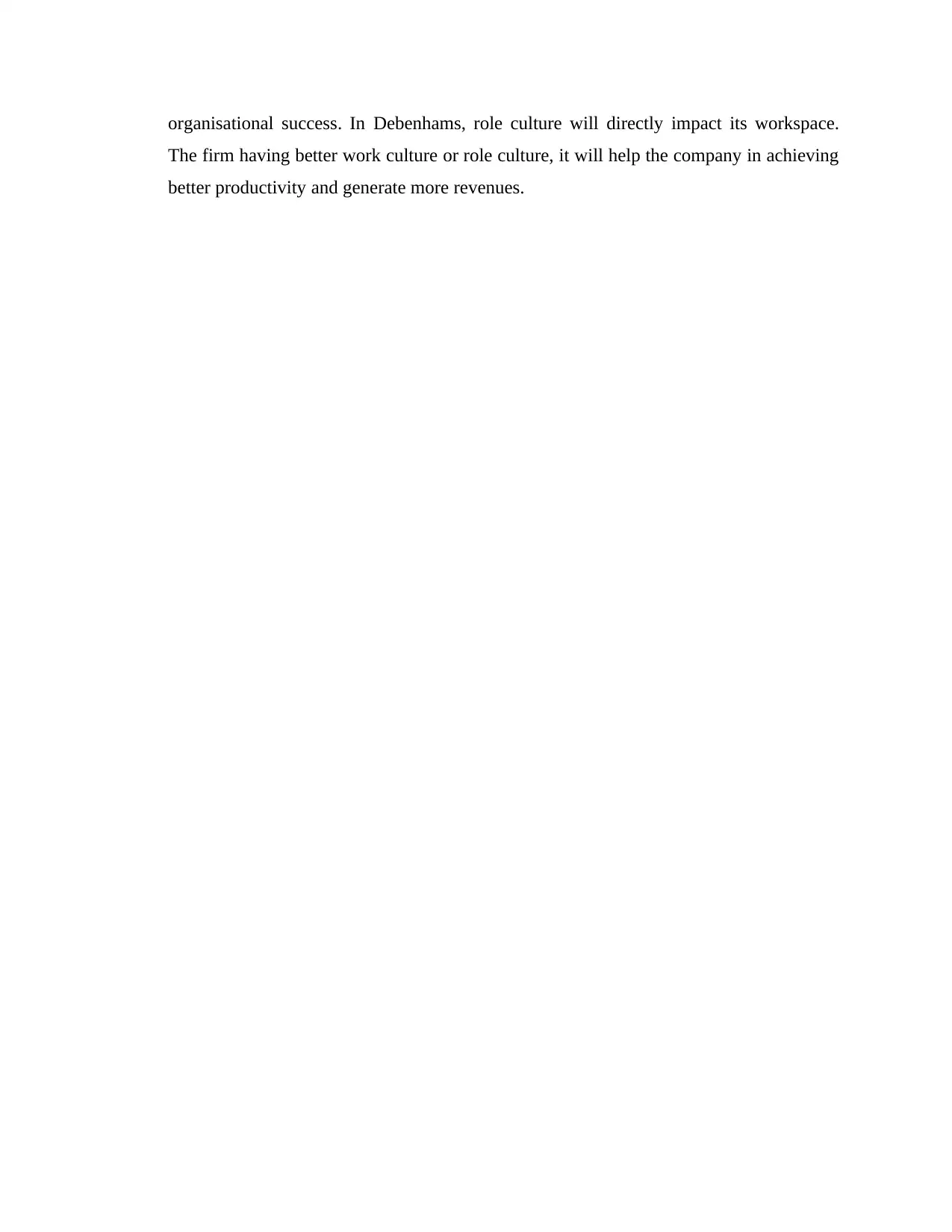
organisational success. In Debenhams, role culture will directly impact its workspace.
The firm having better work culture or role culture, it will help the company in achieving
better productivity and generate more revenues.
The firm having better work culture or role culture, it will help the company in achieving
better productivity and generate more revenues.
Paraphrase This Document
Need a fresh take? Get an instant paraphrase of this document with our AI Paraphraser
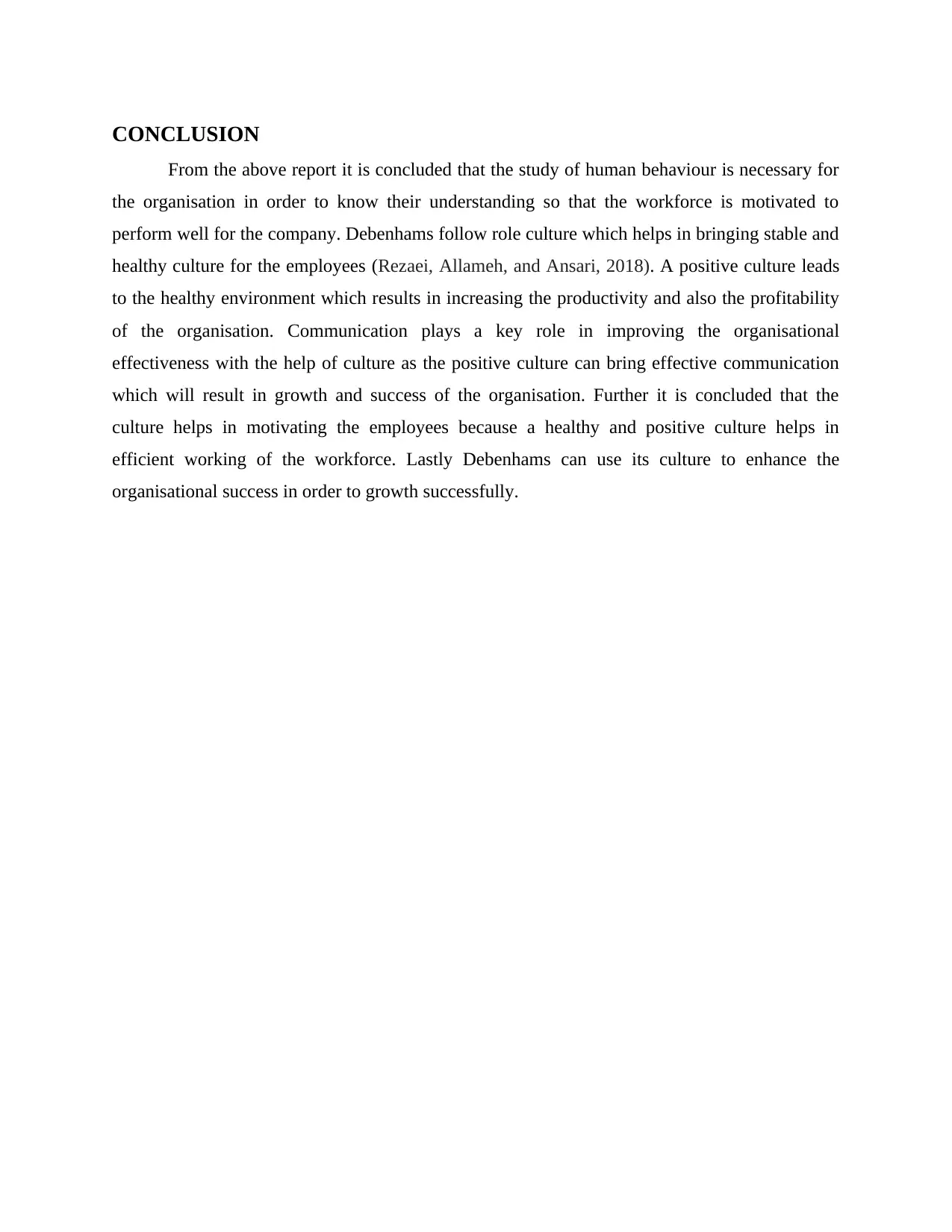
CONCLUSION
From the above report it is concluded that the study of human behaviour is necessary for
the organisation in order to know their understanding so that the workforce is motivated to
perform well for the company. Debenhams follow role culture which helps in bringing stable and
healthy culture for the employees (Rezaei, Allameh, and Ansari, 2018). A positive culture leads
to the healthy environment which results in increasing the productivity and also the profitability
of the organisation. Communication plays a key role in improving the organisational
effectiveness with the help of culture as the positive culture can bring effective communication
which will result in growth and success of the organisation. Further it is concluded that the
culture helps in motivating the employees because a healthy and positive culture helps in
efficient working of the workforce. Lastly Debenhams can use its culture to enhance the
organisational success in order to growth successfully.
From the above report it is concluded that the study of human behaviour is necessary for
the organisation in order to know their understanding so that the workforce is motivated to
perform well for the company. Debenhams follow role culture which helps in bringing stable and
healthy culture for the employees (Rezaei, Allameh, and Ansari, 2018). A positive culture leads
to the healthy environment which results in increasing the productivity and also the profitability
of the organisation. Communication plays a key role in improving the organisational
effectiveness with the help of culture as the positive culture can bring effective communication
which will result in growth and success of the organisation. Further it is concluded that the
culture helps in motivating the employees because a healthy and positive culture helps in
efficient working of the workforce. Lastly Debenhams can use its culture to enhance the
organisational success in order to growth successfully.
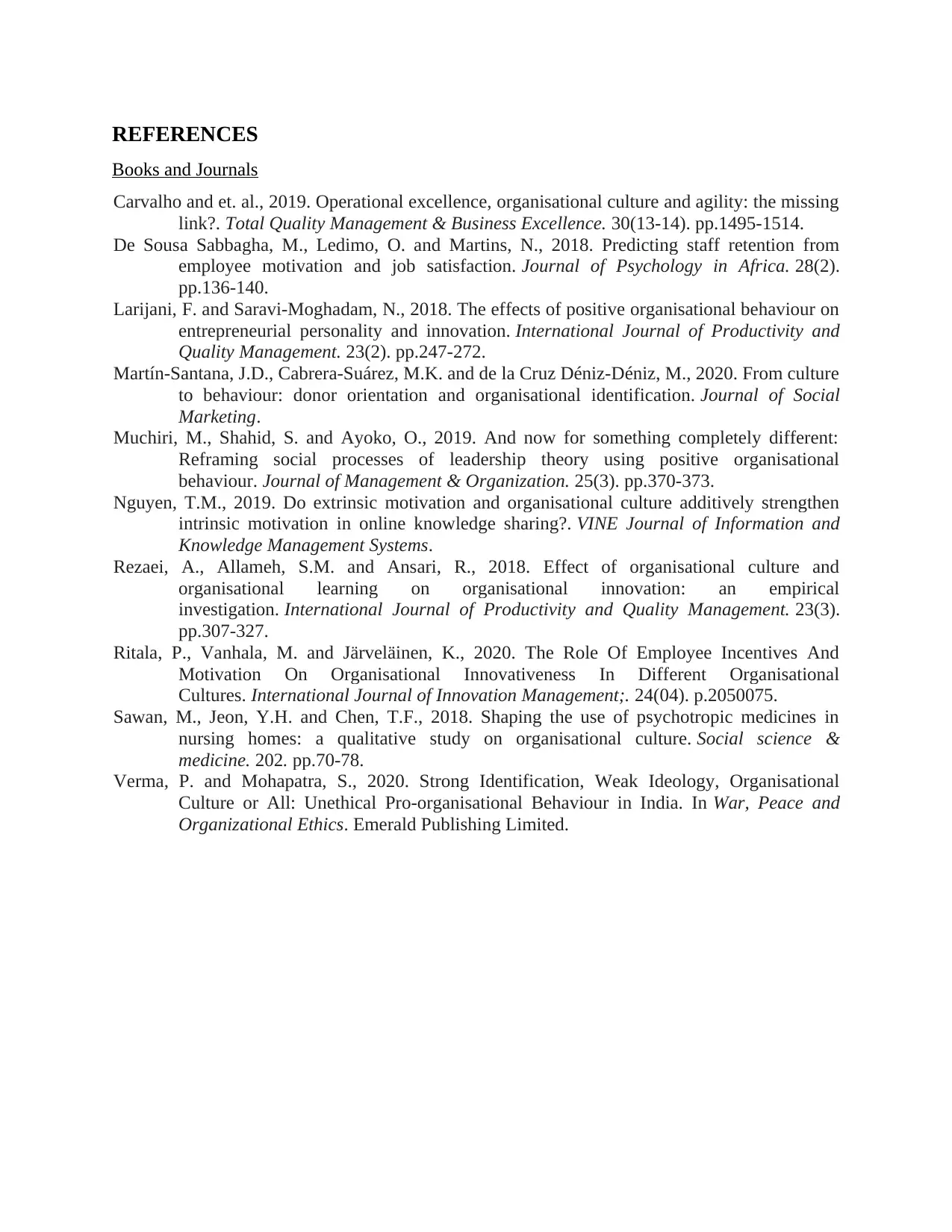
REFERENCES
Books and Journals
Carvalho and et. al., 2019. Operational excellence, organisational culture and agility: the missing
link?. Total Quality Management & Business Excellence. 30(13-14). pp.1495-1514.
De Sousa Sabbagha, M., Ledimo, O. and Martins, N., 2018. Predicting staff retention from
employee motivation and job satisfaction. Journal of Psychology in Africa. 28(2).
pp.136-140.
Larijani, F. and Saravi-Moghadam, N., 2018. The effects of positive organisational behaviour on
entrepreneurial personality and innovation. International Journal of Productivity and
Quality Management. 23(2). pp.247-272.
Martín-Santana, J.D., Cabrera-Suárez, M.K. and de la Cruz Déniz-Déniz, M., 2020. From culture
to behaviour: donor orientation and organisational identification. Journal of Social
Marketing.
Muchiri, M., Shahid, S. and Ayoko, O., 2019. And now for something completely different:
Reframing social processes of leadership theory using positive organisational
behaviour. Journal of Management & Organization. 25(3). pp.370-373.
Nguyen, T.M., 2019. Do extrinsic motivation and organisational culture additively strengthen
intrinsic motivation in online knowledge sharing?. VINE Journal of Information and
Knowledge Management Systems.
Rezaei, A., Allameh, S.M. and Ansari, R., 2018. Effect of organisational culture and
organisational learning on organisational innovation: an empirical
investigation. International Journal of Productivity and Quality Management. 23(3).
pp.307-327.
Ritala, P., Vanhala, M. and Järveläinen, K., 2020. The Role Of Employee Incentives And
Motivation On Organisational Innovativeness In Different Organisational
Cultures. International Journal of Innovation Management;. 24(04). p.2050075.
Sawan, M., Jeon, Y.H. and Chen, T.F., 2018. Shaping the use of psychotropic medicines in
nursing homes: a qualitative study on organisational culture. Social science &
medicine. 202. pp.70-78.
Verma, P. and Mohapatra, S., 2020. Strong Identification, Weak Ideology, Organisational
Culture or All: Unethical Pro-organisational Behaviour in India. In War, Peace and
Organizational Ethics. Emerald Publishing Limited.
Books and Journals
Carvalho and et. al., 2019. Operational excellence, organisational culture and agility: the missing
link?. Total Quality Management & Business Excellence. 30(13-14). pp.1495-1514.
De Sousa Sabbagha, M., Ledimo, O. and Martins, N., 2018. Predicting staff retention from
employee motivation and job satisfaction. Journal of Psychology in Africa. 28(2).
pp.136-140.
Larijani, F. and Saravi-Moghadam, N., 2018. The effects of positive organisational behaviour on
entrepreneurial personality and innovation. International Journal of Productivity and
Quality Management. 23(2). pp.247-272.
Martín-Santana, J.D., Cabrera-Suárez, M.K. and de la Cruz Déniz-Déniz, M., 2020. From culture
to behaviour: donor orientation and organisational identification. Journal of Social
Marketing.
Muchiri, M., Shahid, S. and Ayoko, O., 2019. And now for something completely different:
Reframing social processes of leadership theory using positive organisational
behaviour. Journal of Management & Organization. 25(3). pp.370-373.
Nguyen, T.M., 2019. Do extrinsic motivation and organisational culture additively strengthen
intrinsic motivation in online knowledge sharing?. VINE Journal of Information and
Knowledge Management Systems.
Rezaei, A., Allameh, S.M. and Ansari, R., 2018. Effect of organisational culture and
organisational learning on organisational innovation: an empirical
investigation. International Journal of Productivity and Quality Management. 23(3).
pp.307-327.
Ritala, P., Vanhala, M. and Järveläinen, K., 2020. The Role Of Employee Incentives And
Motivation On Organisational Innovativeness In Different Organisational
Cultures. International Journal of Innovation Management;. 24(04). p.2050075.
Sawan, M., Jeon, Y.H. and Chen, T.F., 2018. Shaping the use of psychotropic medicines in
nursing homes: a qualitative study on organisational culture. Social science &
medicine. 202. pp.70-78.
Verma, P. and Mohapatra, S., 2020. Strong Identification, Weak Ideology, Organisational
Culture or All: Unethical Pro-organisational Behaviour in India. In War, Peace and
Organizational Ethics. Emerald Publishing Limited.
⊘ This is a preview!⊘
Do you want full access?
Subscribe today to unlock all pages.

Trusted by 1+ million students worldwide
1 out of 13
Related Documents
Your All-in-One AI-Powered Toolkit for Academic Success.
+13062052269
info@desklib.com
Available 24*7 on WhatsApp / Email
![[object Object]](/_next/static/media/star-bottom.7253800d.svg)
Unlock your academic potential
Copyright © 2020–2026 A2Z Services. All Rights Reserved. Developed and managed by ZUCOL.





